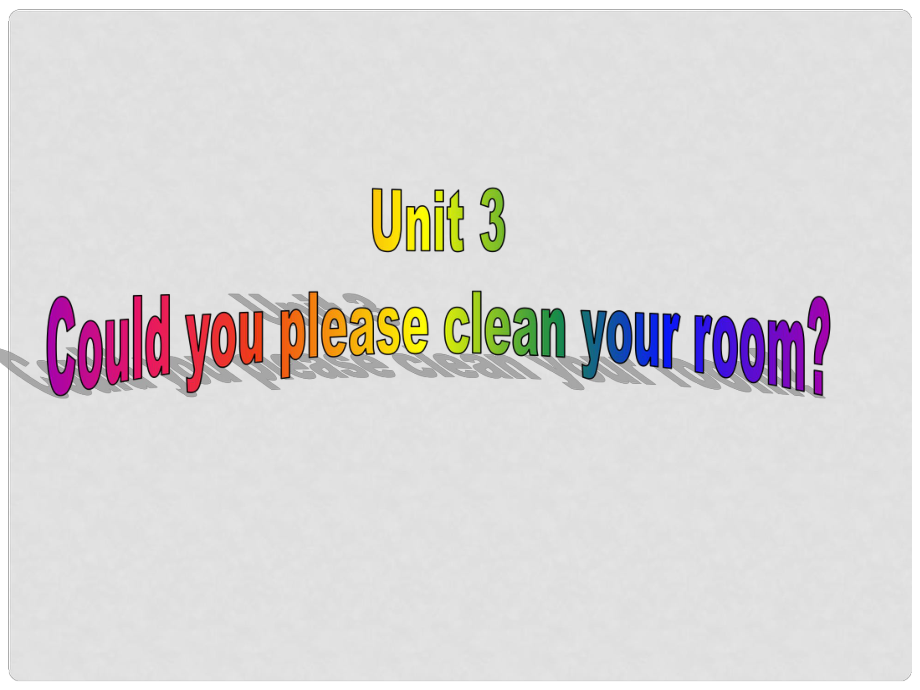《八年級(jí)英語(yǔ)下冊(cè) Unit 3 Could you please clean your room(第3課時(shí))Section A(3a4c)課件 (新版)人教新目標(biāo)版》由會(huì)員分享�����,可在線閱讀,更多相關(guān)《八年級(jí)英語(yǔ)下冊(cè) Unit 3 Could you please clean your room(第3課時(shí))Section A(3a4c)課件 (新版)人教新目標(biāo)版(24頁(yè)珍藏版)》請(qǐng)?jiān)谘b配圖網(wǎng)上搜索����。
1��、GroupsChoresGroup 1Group 2Group 3Group 4Group 5Group 6Have a competition (1) 我扔下書(shū)包去了起居室�����。我扔下書(shū)包去了起居室�����。(2) 我剛坐在電視機(jī)前����,媽媽就過(guò)來(lái)了。我剛坐在電視機(jī)前��,媽媽就過(guò)來(lái)了�����。(3) 你能遛狗嗎���?你能遛狗嗎��?(4) 我和你一樣累�。我和你一樣累。(5) 她沒(méi)做任何家務(wù)����,我也沒(méi)做。她沒(méi)做任何家務(wù)�,我也沒(méi)做。(6) 你可以把鹽遞給我嗎�?你可以把鹽遞給我嗎?(7) 我可以借那本書(shū)嗎�?我可以借那本書(shū)嗎?(8) 借給我一些錢(qián)好嗎��?借給我一些錢(qián)好嗎����?A: What chores does he do every d
2、ay?B: He every day. do the dishes洗餐具洗餐具fold the clothes疊衣服疊衣服water the plant澆花澆花A: What chores does he do every day?B: He every day. do the dishes洗餐具洗餐具fold the clothes疊衣服疊衣服water the plant澆花澆花make the bed整理床鋪整理床鋪sweep the floor掃地掃地wash the car刷車(chē)刷車(chē)take out the rubbish 倒垃圾倒垃圾A: What chores does he do
3���、 every day?B: He every day. Mom: Peter, could you please ? Peter: Yes, sure. /All right. /No problem. / Certainly./ Sorry, I cant. I have to do.Reading3aReading3aThe general idea of the story is about _.A. when to do the choresB. who should do the choresC. how to do the chores(1) Why was Nancys mom
4����、angry with her?_(2) Did they solve the problem? How?_3a3a(1) Why was Nancys mom angry with her?_(2) Did they solve the problem? How?_Read and find.(1) Neither of us did any housework for a week.(2) My mom came over as soon as I sat down in front of the TV.(3) Youre tired, but I tired, too.3bRead and
5、 write.(1) Could you take the dog for a walk? (noun) I walked home from school. (verb)(2) Could I watch one show first? (3) I cant work all day. (4) You watch TV all the time. (5) “What happened?” she asked in surprise. 3c(1) Could I go out for dinner with my friends? Sure, that should be OK.(2) Cou
6�����、ld we get something to drink after the movie? No, you cant. You have a basketball game tomorrow.(3) Could you please take the dog for a walk? OK, but I want to watch one show first.(4) Could you please take out the rubbish? Yes, sure.(1) Could you do ? / Could you please do ? 意為意為“_”����。用來(lái)有禮貌地提出�����。用來(lái)有禮貌地
7�、提出_?����?隙ɑ卮鹩每隙ɑ卮鹩谩癬”����,否定回答用,否定回答用“_”�。如:如:你可以倒垃圾嗎?你可以倒垃圾嗎����?當(dāng)然可以����。當(dāng)然可以�。_(2) Could I do ? 意為意為“_”。用來(lái)���。用來(lái)委婉地請(qǐng)求委婉地請(qǐng)求_����?���?隙ɑ卮鹩谩��?隙ɑ卮鹩谩癬”����,否定回答用,否定回答用“_”���。如:�。如:我可以看電視嗎?我可以看電視嗎���?當(dāng)然可以����,但是你必須先完成作業(yè)���。當(dāng)然可以����,但是你必須先完成作業(yè)����。_一��、一����、For one week, she did not do any housework and neither did I._1. 句中句中neither是是_詞,意為詞����,意為“_”�?����!皀either + 謂語(yǔ)謂語(yǔ)
8��、 (be動(dòng)詞�����,情態(tài)動(dòng)詞�,助動(dòng)詞動(dòng)詞,情態(tài)動(dòng)詞����,助動(dòng)詞) + 主語(yǔ)主語(yǔ)”位于否定句之后,意位于否定句之后�,意為為“某人也一樣不某人也一樣不”。如:我不會(huì)游泳���,我哥哥也不會(huì)���。如:我不會(huì)游泳,我哥哥也不會(huì)。I cant swim. _ _ my brother.2. neither作代詞時(shí)��,表示作代詞時(shí)�,表示“兩者都不兩者都不”。作主語(yǔ)時(shí)�,謂語(yǔ)動(dòng)詞用單。作主語(yǔ)時(shí)����,謂語(yǔ)動(dòng)詞用單數(shù)。如:我父母都不是教師��。數(shù)���。如:我父母都不是教師���。Neither of my parents _ (be) a teacher.3. neither 可用作形容詞��,意思為可用作形容詞���,意思為“兩者都不兩者都不”�����,后面直接跟可數(shù)
9�����、名��,后面直接跟可數(shù)名詞的單數(shù)形式��。作主語(yǔ)時(shí)���,謂語(yǔ)動(dòng)詞用單數(shù)形式�。如:詞的單數(shù)形式�。作主語(yǔ)時(shí),謂語(yǔ)動(dòng)詞用單數(shù)形式��。如:兩個(gè)答案都不對(duì)����。兩個(gè)答案都不對(duì)。Neither answer _ _.二�、二、Could you please pass me the salt?_pass 意為意為“_”��,“把某物傳遞給某人把某物傳遞給某人”的結(jié)構(gòu)為的結(jié)構(gòu)為_(kāi)�,也可直接跟雙賓語(yǔ)���,結(jié)構(gòu)為,也可直接跟雙賓語(yǔ)����,結(jié)構(gòu)為pass sth. to sb.。類似此用法的詞還有類似此用法的詞還有_�、_、_�。如:如:我遞給爸爸一杯水。我遞給爸爸一杯水�。I _ my father _ _ _ _.I _ a cup of wate
10、r _ my father.三�����、三���、Could I borrow that book?_1. borrow 意為意為“_”��,“向某人借某物向某人借某物”的結(jié)的結(jié)構(gòu)為構(gòu)為borrow sth. from sb.�。如:���。如:昨天我向湯姆借了自行車(chē)。昨天我向湯姆借了自行車(chē)。_2. borrow的反義詞是的反義詞是_��,意為��,意為“借給�;借借給;借出出”�����?!鞍涯澄锝杞o某人把某物借給某人”的結(jié)構(gòu)為的結(jié)構(gòu)為lend sb. sth. 或或_。如:�。如:瑪麗把她的新詞典借給了我。瑪麗把她的新詞典借給了我����。_1. _ Could I hang out with my friends after the movi
11、e?2. _ Could you please pass me the salt?3. _ Could I borrow that book?4. _ Could you help me do the dishes?5. _ Could you lend me some money?a. Yes, here you are.b. Hmm. How much do you need?c. Yes, sure. No problem. I finished reading it last night.d. Yes, but dont come back too late.e. No, I cant
12����、. I cut my finger and Im trying not to get it wet.一、請(qǐng)求寫(xiě)一��、請(qǐng)求寫(xiě)R�����,允許寫(xiě),允許寫(xiě)P�����。然后將問(wèn)句和答語(yǔ)連線�。然后將問(wèn)句和答語(yǔ)連線。二����、補(bǔ)全對(duì)話。二��、補(bǔ)全對(duì)話���。A: I hate to _ chores.B: Well, I hate some chores too, but I like other chores.A: Really? Great! _ I ask you to _ me with some chores then?B: What do you need help with?A: _ you please _ my clo
13�、thes for me?B: I dont want to do that! Its boring!A: OK. Then _ you _ do the dishes for me?B: Sure, no problem. But _ we go to the movies after that?A: Sure. Ill finish my homework while you help me with the dishes. Then we can go to the movies.二�����、補(bǔ)全對(duì)話����。二��、補(bǔ)全對(duì)話。A: I hate to _ chores.B: Well, I hate som
14�、e chores too, but I like other chores.A: Really? Great! _ I ask you to _ me with some chores then?B: What do you need help with?A: _ you please _ my clothes for me?B: I dont want to do that! Its boring!A: OK. Then _ you _ do the dishes for me?B: Sure, no problem. But _ we go to the movies after that
15、?A: Sure. Ill finish my homework while you help me with the dishes. Then we can go to the movies.三�����、列出你們組為野營(yíng)旅行需要做的東西的列表�。然后討論誰(shuí)將做三、列出你們組為野營(yíng)旅行需要做的東西的列表���。然后討論誰(shuí)將做它們并完成圖表�。它們并完成圖表���。A: Could you please bring a tent, Liu Chang?B: Sure. And could you please ?C: Sorry, I cant. I have to To-do listNamebring a tentLiu Chang1. Write the sentences in Grammar Focus twice. ()2. Read and recite the passage in 3a. ()3. Please make a plan to help your parents do some chores at home. ()
 八年級(jí)英語(yǔ)下冊(cè) Unit 3 Could you please clean your room(第3課時(shí))Section A(3a4c)課件 (新版)人教新目標(biāo)版
八年級(jí)英語(yǔ)下冊(cè) Unit 3 Could you please clean your room(第3課時(shí))Section A(3a4c)課件 (新版)人教新目標(biāo)版

